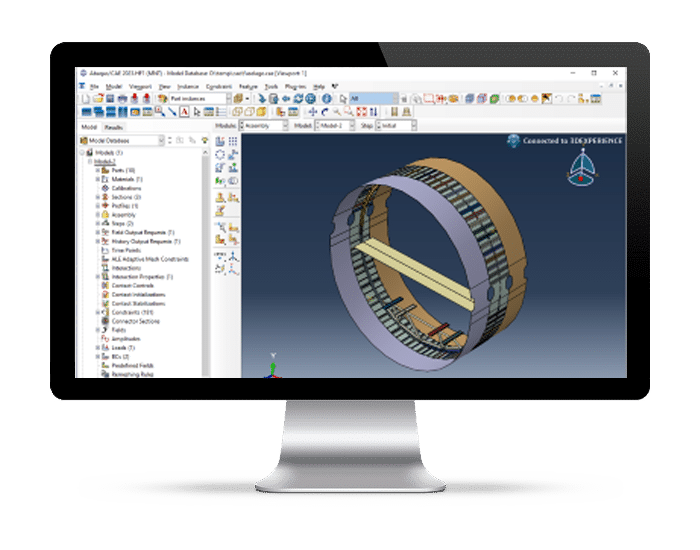
Abaqus Unified FEA
The best suite of non-linear Finite Element Analysis (FEA) and Computational Fluid Dynamics (CFD) solvers.
What Can You Do with Abaqus FEA?
FEA and Multiphysics
Linear and non-linear, Coupled physics (structural acoustics, thermal-electrical, and more), electromagnetics and smoothed particle hydrodynamics.
Model Preparation and Results Interpretation
The comprehensive set of best-in-class visualization capabilities in Abaqus helps users interpret and communicate model data and analysis results.
Complex Assemblies
Ability to model interactions between deformable bodies, rigid bodies, and self-contact.
Contact, Fracture & Failure
Well-suited for high-speed dynamic events, such as consumer electronics drop testing, automotive crashworthiness, and ballistic impact.
High-Performance Computing
Reducing analysis turnaround time enables the examination of multiple and more detailed design scenarios.
Complex Materials
Rubbers, thermoplastics, powder metals, human tissue, soil, composites, and more.
How to Implement Abaqus FEA in Your Business

A complete solution for Finite Element Modeling
Abaqus/CAE has the tools so that you can easily create, edit, monitor, diagnose, and visualize simulations using the advanced Abaqus analyses. The intuitive, easy to use interface integrates modeling, analysis, and results visualization in a single environment. This enables users to quickly learn the software and become highly productive. For users familiar with Computer-Aided Engineering, Abaqus/CAE supports parametric modelling techniques as well as more traditional methods.

The implicit solver for non-linear static and low speed dynamic events
Abaqus/Standard is ideal for static and low-speed dynamic events where highly accurate stress solutions are important. Within a single simulation, it is possible to analyze a model both in the time and frequency domain. Abaqus/Standard is supported within the Abaqus/CAE modelling environment for all common pre- and post-processing needs. The results at any point within an Abaqus/Standard run can be used as the starting conditions for continuation in Abaqus/Explicit. Similarly, an analysis that starts in Abaqus/Explicit can be continued in Abaqus/Standard.

The explicit solver for fast transient dynamic events
Abaqus/Explicit is ideal for analyses where high-speed, non-linear, transient response dominates the solution. The ability of Abaqus/Explicit to effectively handle severely non-linear behavior, such as contact, makes it very attractive for the simulation of quasi-static events, such as rolling of hot metal and slow crushing of energy absorbing devices. The results at any point within an Abaqus/Explicit run can be used as the starting conditions for continuation in Abaqus/Standard. Similarly, an analysis that starts in Abaqus/Standard can be continued in Abaqus/Explicit.

Connect with your 3DCAD environment using Dassault Systèmes solutions
- Abaqus Associative Interface – CATIA V5
Use CATIA V5 Parts and Products in CAE. Materials and publications can be imported to the Abaqus model. file formats like .CATPart and .CATProduct files can be imported in CAE as well.
- Abaqus Associative Interface – SOLIDWORKS
Use SOLIDWORKS parts and assemblies in Abaqus/CAE. Change the model in SOLIDWORKS and revisions are pushed to CAE without loss of analysis features which were applied earlier to the Abaqus model.
Abaqus Flexible Licensing
- Buy or Lease: Purchase Abaqus outright, or choose a yearly or quarterly lease and add tokens during the contract to fulfill your Simulation needs.
- Flexible scalability: Use tokens to run on additional cores. If you are in a need for extra simulation power, just order additional tokens.
- Pricing model: The Abaqus pricing model not based on functionality, but on using X number of CPU & GPU Cores, and concurrent number of users.
